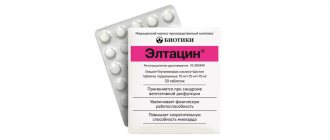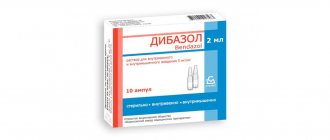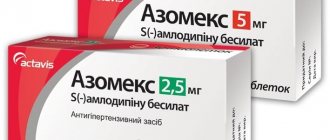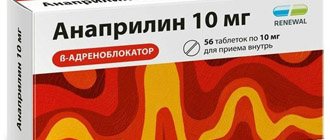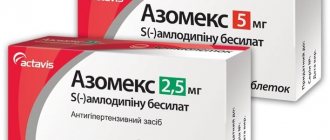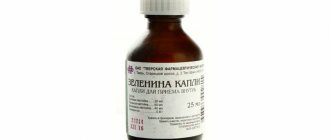Side effects
From the cardiovascular system and blood (hematopoiesis, hemostasis): orthostatic hypotension, tachycardia, peripheral edema.
From the respiratory system: dry cough, bronchospasm, pulmonary edema.
Idiosyncrasy: angioedema of the extremities, face, lips, mucous membranes, tongue, pharynx or larynx is observed when using ACE inhibitors, incl. and captopril.
From the side of water and electrolyte balance: hyperkalemia (most likely in renal failure), hyponatremia (most often with a salt-free diet and simultaneous use of diuretics), proteinuria, increased levels of urea nitrogen in the blood and creatinine, acidosis.
From the hematopoietic system: in rare cases, neutropenia, agranulocytosis, thrombocytopenia and anemia. In patients with normal renal function (creatinine clearance <1.6 mg/dL) in the absence of other complicating factors, neutropenia was observed in 0.02% of cases. Rarely, a positive test for antibodies to nuclear antigen.
From the gastrointestinal tract: taste disturbance (reversible, goes away on its own), dry mouth, aphthous stomatitis, increased activity of liver enzymes, rarely - abdominal pain, diarrhea, gingival hyperplasia, hepatitis, increased levels of hepatic transaminases in the blood plasma and hyperbilirubinemia.
From the skin: rash (mild, maculopapular, disappearing within a few days after reducing the dose), usually accompanied by itching and, in rare cases, increased body temperature; flushing of the face, vesicular and bullous rashes, erythema (including Stevens-Johnson syndrome) and photosensitivity.
From the nervous system and sensory organs: headache, dizziness, ataxia, paresthesia, drowsiness, visual impairment.
How to replace medicine
The list of drug analogues is quite large. The modern pharmaceutical market offers a wide range of substitutes for Capoten. Some of them are cheaper, others are more expensive. Each drug has its own contraindications and side effects, so the question of what to replace Capoten with should only be answered by a specialist, based on the patient’s diagnosis, medical history and individual characteristics of the body. We propose to consider a list of drugs that are similar in their action, composition and scope of application.
The selection of analogues should only be carried out by a qualified specialist
Important! This article provides informational information. You can get more accurate information from your doctor.
Enap
The product is produced in the form of light orange flat tablets with beveled edges. Sometimes white inclusions are allowed. The active ingredient of the drug is enalapril maleate. Enap is classified as an angiotensin-converting enzyme inhibitor drug. It is known that the renin-angiotensin system plays an important role in the regulation of human blood pressure. It is responsible for the circulation and volume of blood in the body. Enap has a suppressive effect on it, due to which medium and large vessels dilate and blood pressure decreases.
Indications:
- primary hypertension;
- complex treatment of heart failure;
- prevention of complications, including myocardial infarction, in patients with impaired functioning of the left cardiac ventricle.
The amount taken at the initial stage of treatment is usually 5 mg. In the absence of the desired therapeutic effect, the rate is slowly increased within two weeks.
Contraindications:
- intolerance to other drugs belonging to the group of ACE inhibitors;
- pregnancy;
- a history of angioedema during treatment with angiotensin-converting enzyme inhibitors;
- pathological processes in the kidneys and liver.
Enap is a popular ACE inhibitor
The drug is dispensed from pharmacies upon provision of a prescription from the attending physician. Self-treatment with it is strictly contraindicated.
Andipal
Andipal is a multicomponent drug that includes papaverine, dibazol, analgin and phenobarbital. The substitute has a mild analgesic, sedative, and antispasmodic effect.
Indications for use:
- vascular spasms in the brain;
- migraine;
- arterial hypertension;
- circulatory disorders.
The dosage of the drug is determined by the doctor taking into account the diagnosis. Typically, patients are prescribed 2-3 tablets throughout the day, washed down with water.
Contraindications:
- muscle weakness, cramps;
- disturbance of glucose levels in the body;
- various skin pathologies;
- acute dysfunction of the liver, kidneys.
Side effects include digestive disorders, nausea, pain in the stomach and intestines, drowsiness, depression, and changes in blood composition.
Andipal reduces blood pressure and restores blood flow
Important! Patients taking the pills should avoid driving vehicles and driving potentially dangerous machinery.
Moxonidine
Moxonidine is an antihypertensive drug that exerts reflex and tonic control over the sympathetic nervous system. The drug reduces blood pressure, while the heart rate and blood circulation in the brain are not disturbed.
The main indication for use is arterial hypertension of various origins, including increased pressure due to diabetic nephropathy and other diseases.
Contraindications:
- the patient is under 18 years of age;
- pregnancy;
- history of epileptic seizures;
- severe heart failure;
- bradycardia and acute arrhythmia;
- heart failure in the acute period.
Side effects include allergic manifestations (itching of the skin, rashes, nasal congestion), fatigue, depression, headache, dry mouth and other negative conditions.
The instructions for use of the drug indicate that treatment of patients should begin with a dosage of 20 mg throughout the day. The rate gradually increases, but cannot exceed 60 mg.
Enalapril
Another popular drug belonging to the group of ACE inhibitors is Enalapril. The drug is produced by the Russian company NIZHFARM JSC in the form of round biconvex tablets. The active component of the drug described is enalapril maleate.
A popular antihypertensive drug is Enalapril.
Enalapril affects the rate of conversion of the hormone angiotensin I to angiotensin II, due to which blood pressure returns to normal. The action of the drug is aimed at restoring renal and coronary blood flow, reducing pre- and afterload from the myocardium, increasing the tolerance of the cardiovascular system to physical and psychological stress.
Indications:
- renovascular, primary hypertension;
- prevention of myocardial infarction, coronary ischemia and other complications in patients with impaired activity of the left ventricle of the heart;
- unstable angina.
The initial dosage of the drug is usually 2.5 mg. The dose is increased every 7 days and cannot exceed more than 60–80 mg, depending on the patient’s condition.
Interaction
Diuretics, ganglion blockers, adrenergic blockers enhance the hypotensive effect of Capoten. Potassium-sparing diuretics (triamterene, amiloride, spironolactone) or potassium dietary supplements may lead to a marked increase in serum potassium concentrations. Indomethacin (and other NSAIDs), as well as clonidine, may reduce the antihypertensive effect of Capoten. Allopurinol and procainamide in combination with Capoten may cause neutropenia and/or Stevens-Johnson syndrome (the causal relationship is unclear). Immunosuppressants (azathioprine, cyclophosphamide) increase the risk of developing hematological disorders when used together with Capoten. Probenecid reduces the excretion of captopril through the kidneys. The simultaneous use of lithium salts and ACE inhibitors may lead to an increase in the concentration of lithium in the blood serum. This increases the risk of side and toxic effects of lithium drugs.
Adverse reactions
The instructions mention possible negative manifestations in response to treatment with Capoten. Patients may experience:
- anorexia, increased potassium levels;
- decrease in eosinophils, platelets, agranulocytes;
- uniformly or periodically changing accelerated heartbeat, decreased blood pressure;
- hot flashes, pale skin, swelling of peripheral areas;
- dry nonproductive cough, shortness of breath, bronchospasm, swelling of the lung tissue;
- attacks of dizziness, cephalalgia, drowsiness, circulatory disorders, problems with skin sensitivity;
- decreased visual acuity, increased dryness of the oral mucosa;
- dyspeptic disorders, stomatitis, glossitis, gastrointestinal ulcerations, discomfort in the abdominal area;
- liver dysfunction, hepatitis, jaundice, cholestasis;
- obsessive itching, dermatological rash, focal baldness, urticaria;
- swelling of the face, arms and legs, tongue, larynx, pharynx;
- painful sensations in muscles and joints;
- renal dysfunction, decreased urine production, increased urge to urinate;
- gynecomastia, sexual impotence;
- soreness in the chest area, asthenia, rapid onset of fatigue.
The occurrence of adverse reactions requires immediate contact with your doctor and replacement of Capoten with an analogue more suitable for the body.
Directions for use and doses
Inside.
Arterial hypertension. Capoten should be used in the lowest effective dose and is selected individually for each patient.
Mild/moderate hypertension. The initial dose is 12.5 mg 2 times a day. The maintenance dose is 25 mg 2 times a day. If necessary, the dose is increased every 2–4 weeks. The usual effective therapeutic dose is 50 mg 2 times a day.
Severe hypertension. The initial dose is 12.5 mg 2 times a day. The dose is gradually increased to a maximum dose of 150 mg (50 mg 3 times a day). When using the drug Capoten simultaneously with other antihypertensive drugs, individual dosage selection is recommended. The maximum daily dose is 150 mg.
Heart failure. Treatment should begin under medical supervision. When using an initial dose of 6.25 mg 3 times a day, the effect of transient hypotension can be minimized as much as possible. The usual maintenance dose is 25 mg 2-3 times a day. If necessary, the dose is increased every 2 weeks. The maximum daily dose is 150 mg.
Myocardial infarction. Treatment can begin as early as 3 days after myocardial infarction. The starting dose is 6.25 mg 3 times a day, gradually increasing to 25 mg 3 times a day over several weeks. If necessary, the dose is gradually increased to a maximum daily dose of 150 mg (50 mg 3 times a day).
If symptomatic hypotension occurs, a dose reduction may be necessary. Capoten can be used together with other drugs, for example, thrombolytics, acetylsalicylic acid and beta-blockers.
Diabetic nephropathy. The recommended daily dose is 75 to 100 mg 2-3 times a day. For insulin-dependent diabetes with microalbuminuria (albumin secretion 30–300 mg per day), the dose of the drug is 50 mg 2 times a day. With a total protein clearance of more than 500 mg per day, the drug is effective at a dose of 25 mg 3 times a day
If necessary, you can additionally prescribe other antihypertensive drugs: diuretics, beta-blockers, centrally acting drugs or vasodilators.
Renal dysfunction. For mild/moderate renal impairment (creatinine Cl - at least 30 ml/min/1.73 m2), the daily dose is from 75 to 100 mg 2-3 times a day. In case of severe renal dysfunction (creatinine Cl - less than 30 ml/min/1.73 m2), the initial dose is no more than 12.5 mg 2 times a day. If the effectiveness is insufficient, the dose is slowly increased every 1–2 weeks until a therapeutic effect occurs, but the maximum daily dose of the drug should be reduced or the interval between doses of the drug should be increased. If necessary, loop diuretics are additionally prescribed rather than thiazide-type diuretics.
For elderly patients, the dose of the drug is selected individually. It is recommended to start treatment with the lowest therapeutic dose and maintain it at this level.
Children. The safety and effectiveness of the drug in children have not been studied.
What is Kapoten used for?
Capoten belongs to the group of ACE inhibitors and is prescribed to patients with the following conditions:
- arterial hypertension of various origins;
- chronic course of heart failure or acute period after myocardial infarction;
- pathological changes in the left ventricle of the heart, including latent course;
- surges in blood pressure due to diabetic nephropathy.
The drug is produced in the form of tablets, which contain an active ingredient such as captopril. Tablets are packed in blisters. A cardboard pack contains 2 or 4 plates of 10–14 tablets each.
The pharmacological effect of the drug is ensured by inhibiting the process of transition of the enzyme angiotensin I to angiotensin II. This ensures dilation of blood vessels, reducing blood pressure in them. Blood circulation to the brain is not impaired, pre- and afterload from the heart muscle is reduced, renal and coronary blood flow is restored.
Take Capoten orally with plenty of water. The drug is rapidly absorbed, the hypotensive effect occurs within 30–40 minutes. The maximum amount of active substance in the body is observed after 90 minutes. The half-life is 3–4 hours. It is excreted primarily by the kidneys.
Despite the fact that the described medicine has many advantages, it is not suitable for all patients. Patients have to look for alternative remedies. In such situations, the doctor selects similar drugs.
Precautionary measures
Prescribe with caution to patients with vascular collagenosis due to the increased risk of neutropenia and agranulocytosis.
When prescribing the drug to patients with severe water-electrolyte imbalances, they should be corrected. During treatment with the drug, it is not recommended to take potassium-sparing diuretics and potassium nutritional supplements, especially in patients with impaired renal function.
If, when using captopril, swelling is limited to the face and lips, then the drug should be discontinued and antihistamines should be prescribed. If swelling covers the tongue, pharynx, larynx with a threat of developing airway obstruction, subcutaneous adrenaline (0.5 ml of 0.1% solution) should be administered.
During treatment, a low sodium diet is indicated.
Patient reviews
Lyubov, Moscow “If arterial hypertension is not treated in a timely manner, it will not lead to anything good. I myself have suffered from high blood pressure for more than 10 years. During the promotion, I feel very bad, my head hurts, I feel tightness in my chest and pain. The medicine Enap saves me. The doctor prescribed me the pills after an examination in the hospital. I am very pleased with the product."
Ivan, Khabarovsk “I was hospitalized six months ago with a heart attack. Before that, I didn’t take care of my health, and attributed headaches and weakness to constant fatigue. I learned from bitter experience that you need to monitor your blood pressure. Now I use Enalapril to normalize its level. The doctor told me to measure my blood pressure regularly and take a pill if necessary. Fortunately, I feel good now.”
Alina, Barnaul “When there are pressure surges, I take Andipal. My grandmother also used the tablets. Now I am also faced with the problem of high blood pressure. In addition to taking medication, I try to lead a healthy lifestyle and eat right. I hope I don’t have any complications.”
Ekaterina, Magnitogorsk “Previously, it was mainly heart patients and elderly patients who suffered from high blood pressure, but now this scourge even torments many young people. I myself experience rapid heartbeat and increased blood pressure regularly due to stress. The doctor prescribed me Captopril. One tablet and my condition improves. I’m planning to change the medicine soon, so I’ll have to start looking for a suitable analogue.”

